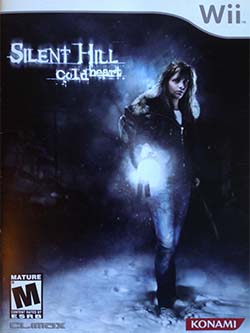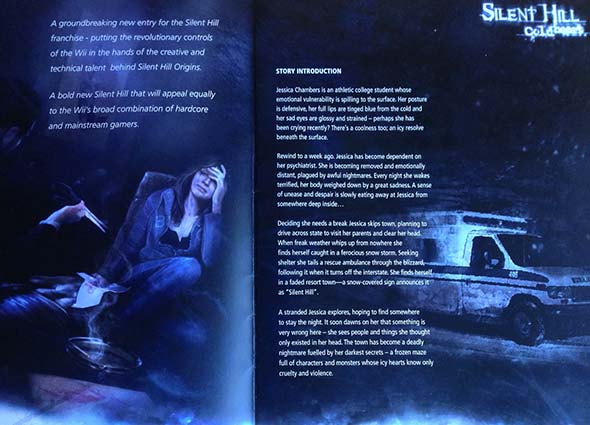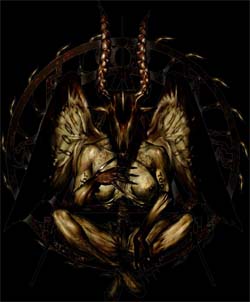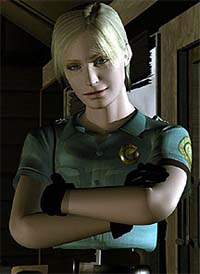
Shattered Memories was derived from
a pitch called "Cold Heart",
which was not supposed to be a "re-imagining".
This may be old news to some people, but earlier this month, I came across a post on Silent Hill Memories dot net that included scans of the full, 14-page pitch document for the game that became Silent Hill: Shattered Memories. Climax held a contest to give away seven copies of the document to fans, and scans of the document have since been posted online in various sources.
The document tells us that the final product ended up being radically different than the original concept. Apparently, Climax did not originally intend to do a remake / reboot / "re-imagining" of the original Silent Hill. Instead the plot would continue on with the standard Silent Hill timeline (presumabely following the events of Homecoming) with a new character. The game's working title was Silent Hill: Cold Heart. The document outlines what some of the game's intended features were supposed to be (including combat mechanics that were completely cut from the final product), describes the main character, and also provides a brief walkthrough of an early chapter of the game.
The introduction page describes the playable character: Jessica Chambers. Jessica was planned to be an over-stressed and emotionally-vulnerable college student. She ends up in Silent Hill after a freak snow storm causes her car to crash on her way to visit her parents.

Page 1 and 2 describe the main character, Jessica Chambers, and how she ends up in Silent Hill.
Jessica is described as being "emotionally vulnerable" and is dependent on a therapist. She has nightmares and is "weighed down by a deep sadness". The pitch doesn't specify the nature of this sadness or her reason for being dependent on a therapist (other than perhaps the stress of college).
I would suspect that the reason for her sadness and the therapy would have been similar to Shattered Memories: that one or both of her parents are probably dead, she has repressed the memory, and experiences nightmares of Silent Hill as a subconscious attempt to confront these repressed memories. You know, repressed memories of dead people is what Silent Hill is all about, right? ... [More]
3ffed8ed-e518-4294-811c-8ecf5f0019c3|7|3.4
Tags:Silent Hill Shattered Memories, Silent Hill Cold Heart, Konami, Nintendo, Wii, pitch, sequel, reboot, therapy, horror, puzzle, combat, map, Jessica Chambers, Cheryl Mason, Heather Mason, women, Silent Hill, Climax Studios

I was going through the comments on my posts a while back, and I came across a doozy of a comment by user Maiden T. I'm not going to replicate the entire post here, but you can review the comment at the link provided. In summary, the commenter asserts that Silent Hill, as a series, was never about occultism, and that all the games were "repressed-memory morality tales". The first Silent Hill and "to an extent the third one" are the exceptions (according to Maiden T).

Totally unrelated image of a demon god...
My mind just about exploded when I read this comment, and I started typing up a response, only to realize that I had written a whole blog's worth of counter argument. So, I decided to just turn it into a new blog. I'll continue my series of analysis and interpretation articles about Silent Hill with a write-up about how the series is most definitely about occultism.
What is Silent Hill about?
I've already tackled two topics that I consider to be common myths about Silent Hill. The first was about the over-sexualization of Pyramid Head, and the second was about the realness of the Otherworld. Now I'll address one of the most fundamental misunderstandings about the series: what is it about?
The repressed-inner-demon myth
Probably the most core and fundamental myth about the Silent Hill series is the continued propagation of the idea that the series (as a whole) is about characters dealing with repressed inner demons - typically a repressed memory of guilt over a perceived sin which they have committed. This idea is rooted in the popularity of Silent Hill 2. It is so pervasive, that the designers and producers of newer installments of the series embrace it, while dismissing the other critical elements of the other games' stories:
"[My favorite SH game is] Silent Hill 2. I didn’t really care for all the heavy occult based storyline in SH1 and 3. I felt SH2 had the best stand alone storyline, and provided the best atmosphere of all the SH games by far.
[...]
I find all the in’s and out’s of ‘The Order’ to be overly intricate and rather uninteresting, but that’s just my opinion."
- Devin Shatsky (producer, Shattered Memories, Downpour), in an interview with Hell's Descent (Nov 5, 2010).
The reason that Silent Hill 2's design was so successful (and unique within the series) is because SH2's excellent atmosphere was based around feelings of melancholy and depression rather than fear and threat.
Exploring a character's personal guilt and depression works great when the entire game is designed around that central, unifying theme! It doesn't work quite so well when ... [More]
04f88e94-11ac-43f4-beb3-1cd282060bf0|19|4.1
Tags:Silent Hill, Silent Hill 2, Silent Hill 3, Silent Hill 4: the Room, Silent Hill Origins, Silent Hill Homecoming, Silent Hill Downpour, Silent Hill Shattered Memories, Team Silent, Konami, cult, occult, fan fiction, horror, Harry Mason, Alessa, Dahlia Gillespie, Cheryl Mason, Heather Mason, James Sunderland, Red Pyramid Thing, Pyramid Head, Claudia Wolf, Vincent Smith, Henry Townshend, Walter Sullivan, Travis Grady, Alex Shepherd, Shepherd's Glen, Murphy Pendleton, ritual, Flauros, demon, god, Mary Shepherd-Sunderland

Stumbled onto this Gamefaqs forum topic about Masahiro Ito "confirming" that the Good ending of Silent Hill is canon, and that Cybil is supposed to die. Many fans apparently see this as absolute validation of their dogmatic opinions on the topic, and that to argue otherwise is moronic. I don't understand why there is so much vitriol thrown towards people who support the Good+ ending and Cybil's survival. Why does the fanbase want Cybil dead so much?
There are three key arguments that I hear in defense of the "Good is the only canonical ending" position:

Why do fans want Cybil dead?
- Harry wouldn't have known what the Red Liquid does until after he sees Kaufman use it on Alessa, and so he couldn't have used it on Cybil earlier.
- If Harry used the Red Liquid to save Cybil, then he couldn't have had any left over to solidify into the pendant for Heather.
- Cybil does not appear in any subsequent Silent Hill. She is not referenced in SH3, and in Silent Hill Homecoming, Deputy Wheeler refers to a female police officer who went to Silent Hill and never returned. Clearly, this means that Cybil is dead.
To many fans, these three arguments are bullet proof! At this point, they've practically become gospel (along with Pyramid Head's well-known rape antics).
But how well do these arguments really stack up to scrutiny? Let's play Devil's Advocate...
I'm going to start with Masahiro Ito's comments on the issue:
On Mashiro Ito's Twitter feed, he "confirms" that Cybil is dead.
[More]
94751804-81b6-4eed-b2d7-5732686eda1e|14|4.8
Tags:Silent Hill, Silent Hill 2, Silent Hill 3, Silent Hill 4: the Room, Silent Hill Homecoming, Konami, Team Silent, Masahiro Ito, Hiroyuki Owaku, Keiichiro Toyama, Cybil Bennett, Harry Mason, Cheryl Mason, Kaufman, Lisa, ending, red liquid, aglaophotis, pendant, possession, occult, Good vs Good+
Fathers in video games don't typically turn out to be very good role models or successful parental figures. Often, they end up being surprise villains, or they turn out to have been neglectful or abusive (physically or emotionally). A lot of times, parents in video games turn into cannon fodder, dying early in the game in order to push the protagonist into his or her heroic role.
Very rarely do you have a father character in a video game who sticks around and actually gives his children any amount of love or support. That's why I think Harry Mason is such a special character in video games, and quite possibly the best video game dad of all time. So this Father's Day, I'd like to take a moment to pay tribute to this wonderfully-designed gold-standard of video game parenting.

Harry Mason goes through hell and puts his life on the line to protect his seven-year-old adopted daughter in quite possibly the most fatherly display of love and dedication that you will find in a video game.
I recently had conversations with an old friend of mine from high school (screenname Huh?Mr.Box!) who had recently played the Silent Hill games for the first time. I expected to hear that his favorite game was Silent Hill 2, and that his favorite character would be James or Pyramid Head. I mean, that's what every Silent Hill fanboy says, right? Personally, I'm fond of Heather from Silent Hill 3. I'll admit, I had a huge crush on her when I played the game for the first time (and before you start calling me a perv, I was 17 when that game released!) because it was so unusual to see such a well-developed female character in a game.
I was surprised, however, when my friend's favorite character ended up not being James, or Pyramid Head, or even Heather, but rather Heather's father: Harry.
I guess with all the crazy characters that the Silent Hill series is known for, Harry kind of gets lost in the shuffle as being too "normal". But when asked why he liked Harry so much, my friend eloquently responded: "because he's such an awesome dad!"
And you know what, Harry is an awesome dad!... [More]
be3720db-cf6c-4bff-8f74-1c699fac1a42|6|4.5
Tags:Harry Mason, Father's Day, father, single father, parenthood, adoption, gender equality, Silent Hill, Silent Hill 3, Cheryl Mason, Heather Mason, Alessa, Christophe Gans, Huh?Mr.Box!
|

| 12 | | | | | | | 60 | | 11 | | | | | | | 55 | | 10 | | | | | | | 50 | | 09 | | | | | | | 45 | | 08 | | | | | | | 40 | | 07 | | | | | | | 35 | | 06 | | | | | | | 30 | | 05 | | | | | | | 25 | | 04 | | | | | | | 20 | | 03 | | | | | | | 15 | | 02 | | | | | | | 10 | | 01 | | | | | | | 05 |
|